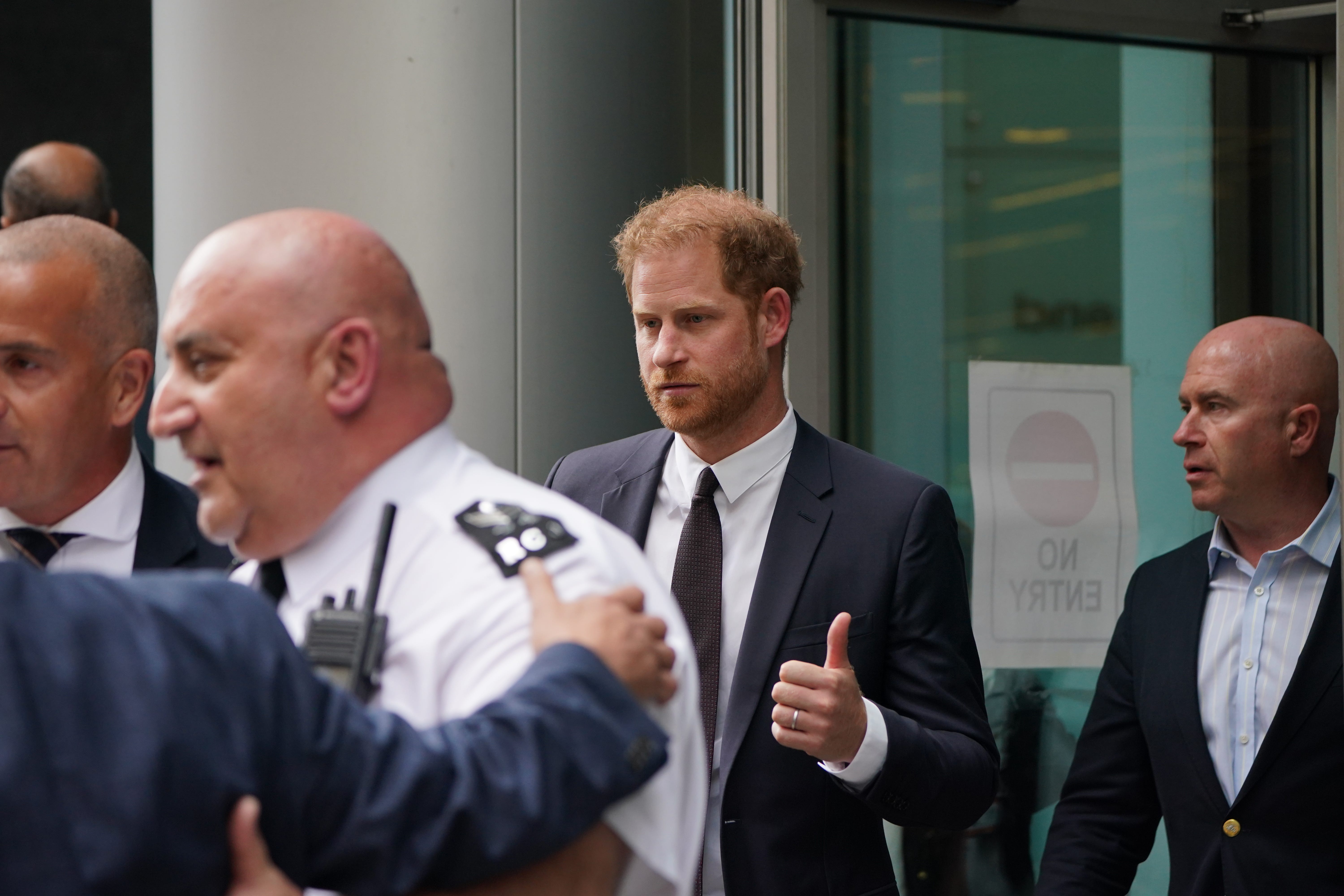Harry tells court of ‘paranoia’ as he gives evidence in High Court hacking claim
The Duke of Sussex faced nearly five hours of cross-examination on Tuesday in his case against Mirror Group Newspapers over alleged unlawful activity.

The Duke of Sussex told the High Court of his “paranoia” as a result of alleged unlawful information-gathering by tabloid journalists as he entered the witness box in his claim against the publisher of the Daily Mirror.
On Tuesday, Harry faced nearly five hours of questions from a barrister for Mirror Group Newspapers (MGN) as he became the first senior royal in more than two decades to personally appear in court proceedings.
The duke, 38, is suing MGN for damages, claiming journalists at its titles – which also include the Sunday Mirror and Sunday People – were linked to methods including phone hacking, so-called “blagging” or gaining information by deception, and use of private investigators for unlawful activities.
In his written evidence before the court, Harry said MGN’s alleged intrusion into his life contributed to “a huge amount of paranoia” in his relationships.
In a 49-page witness statement, the duke said that he found it “very hard to trust anyone, which led to bouts of depression and paranoia”.
“Friendships were lost entirely unnecessarily,” he continued, later adding that some of his friends “became instant targets”.
The duke later said he can now see “how much of my life was wasted on this paranoia”, adding: “I’ve always heard people refer to my mother as paranoid, but she wasn’t.
“She was fearful of what was actually happening to her and now I know that I was the same.”
Harry said he was “shocked and appalled at the sheer volume of payments made by MGN titles to private investigators” and that he felt “physically sick” over eight private investigator payments made concerning his late mother, Diana, Princess of Wales.
The duke also described the state of the British press and the Government as both being at “rock bottom”, with the Government having “no appetite” for press regulation.
Rishi Sunak later refused to be drawn into a war of words over the claim, telling reporters travelling with him on a visit to Washington: “As you know, we have a long-standing convention that prime ministers don’t comment on members of the royal family.”
Harry alleges that about 140 articles published between 1996 and 2010 by MGN titles contained information gathered using unlawful methods, and 33 of these have been selected to be considered at the trial.
Andrew Green KC, for MGN, questioned Harry on about 20 of the 33 articles over the course of the hearing, with the duke’s appearance in court coming just over a month after he attended the coronation of his father, the King.
Harry was asked about why he has complained about articles in MGN titles when the same information had previously been put into the public domain by other media outlets.
The duke said his understanding was that MGN journalists used unlawful methods to get “exclusive” angles on existing stories or to move the story on in some way.
Harry repeatedly said to Mr Green that the barrister would have to ask the journalists who wrote the stories about how they obtained their information.
On a number of occasions he said he did not believe it was his role as a witness to “deconstruct” the articles at the centre of his claim.
He later said that, based on his understanding of how the press operate, just because information was already in the public domain did not mean there was not “an attempt to take the story further”.
The duke told the court his understanding is that there have been a “huge number” of private investigator invoices uncovered from around the time of articles which appeared and said he believed the “vast majority” of stories that appeared were the result of some unlawful activity.
Asked whether he was basing his complaints about MGN articles on invoices, he said: “My understanding is that during this period the hacking was done on burner phones so there is no call data and most of the evidence has been destroyed, so I have little to go on.”
Mr Green also asked Harry about his claim that articles “caused him to be paranoid and to distrust those around him”, and whether he was referring to specific MGN articles or “the general effect of all of the articles” about him.
Harry said: “Yes, because … it is 20 years ago and I simply can’t other than speculate whether I saw these articles at the time.
“I certainly saw a lot of articles at the time and was made aware … unfortunately, by the behaviour and reaction of my inner circle.”
The duke added that when information he had only told to a few members of his inner circle was made public, “your circle of friends starts to shrink”.
MGN is contesting his claim and has either denied or not admitted that articles about Harry being examined at the trial involved phone hacking or unlawful activity.
At the start of the duke’s individual case on Monday, Mr Green said there was “simply no evidence capable of supporting the finding that the Duke of Sussex was hacked, let alone on a habitual basis” and that payment records used in the duke’s claim “simply do not demonstrate unlawful conduct or knowledge thereof”.
Harry’s claim is being heard alongside three other “representative” claims during a trial which began last month and is due to last six to seven weeks.
The three other representative claimants are Coronation Street actor Michael Turner, known professionally as Michael Le Vell, who is best known for playing Kevin Webster in the long-running soap, former Coronation Street actress Nikki Sanderson and comedian Paul Whitehouse’s ex-wife Fiona Wightman.
